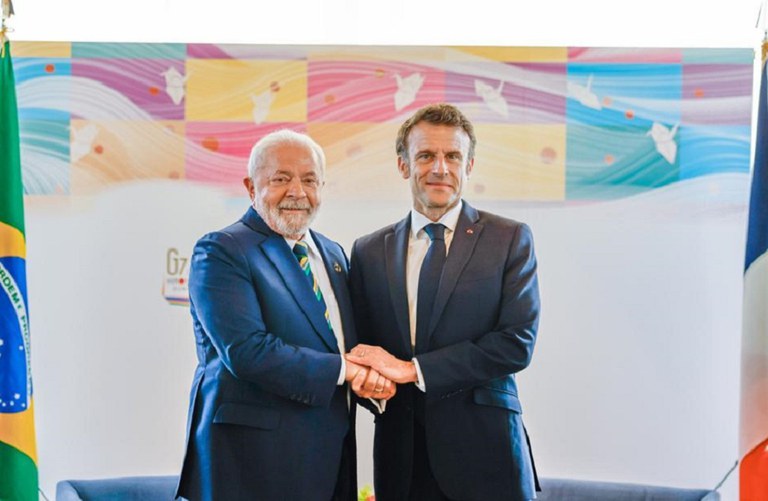Notícias
STRATEGIC PARTNERSHIP
Presidents Lula and Macron meet at the G7 summit and seal resumption of Brazil-France relations

Brazil and France signed a strategic partnership in 2006 - Credit: Ricardo Stuckert (PR)
The heads of state of Brazil and France met today during the G7 summit in Hiroshima, Japan. Presidents Luiz Inácio Lula da Silva and Emmanuel Macron highlighted the resumption of relations between their countries. The leaders discussed defense cooperation and greater cultural exchange, as well as the war in Ukraine.
Brazil and France signed a strategic partnership in 2006, promoting continuous political dialogue and economic-commercial relations. The two countries also cooperate in the fields of defense, space, nuclear energy and sustainable development. The Brazil-France partnership also covers the fields of education, science and technology, as well as migration and cross-border issues.
Besides their joint projects in sensitive and high-tech fields, both the presence of Brazilians living on French soil and the activities of French companies in Brazil are highly significant. According to Itamaraty, around 90,000 Brazilians live in metropolitan France; another 82,500 live in French Guiana - adding up to a total 172,500 people, approximately. Brazil’s 730 kilometer-long frontier with French Guiana in the Brazilian state of Amapá is France's longest land border.
Brazil presently harbors around 860 French companies and is the second largest destination of French investments among emerging economies; it was only recently overtaken by China. France is the third largest investor in Brazil according to the final controller criterion: around USD 38 billion have been invested. France is the fifth largest investor in Brazil according to the immediate investor criterion: approximately USD 32 billion have been invested (Brazilian Central Bank 2021 data).
TRADE BALANCE - Commercial exchange between Brazil and France is varied. In 2022, the main products exported by Brazil were: soybean (21%); crude petroleum oils (16%); iron ore and concentrates (9.1 %); and cellulose (7.5%). Imports are also a mix, and include non-electric motors and machines (15%); organo-inorganic compounds (8.9%); and medicines and pharmaceutical products (5.2%).
EDUCATIONAL AND ACADEMIC COOPERATION - There are currently around 750 bilateral educational and academic cooperation agreements and conventions between Brazilian and French universities. France is traditionally the second country in number of Brazilian students and Brazil’s second partner in scientific production, and has also become one of the favorite destinations of Brazilian scholars.